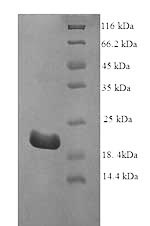Bovine Interferon tau-1 Recombinant Protein Product Attributes
Product Type: Recombinant Protein
Recombinant Interferon tau-1 based upon sequence from: Bovine
Host: QP7076 protein expressed in E.coli, Yeast..
Tag: His
Protein Construction: A DNA sequence encoding the Bos taurus (Bovine) Interferon tau-1, was expressed in the hosts and tags indicated. Please select your host/tag option, above.
Recommended Applications: Immunogen, Protein Standard, Cell culture, or Other Cell Biology Applications.
Application Notes: Please contact us for application specific information for QP7076.
Bioactivity Data: Untested
Full Length? Full Length
Expression Region: Cys24 – Leu195
Amino Acid Sequence: CYLSEDHMLG ARENLRLLAR MNRLSPHPCL QDRKDFGLPQ EMVEGNQLQK DQAISVLHEM LQQCFNLFYT EHSSAAWNTT LLEQLCTGLQ QQLEDLDACL GPVMGEKDSD MGRMGPILTV KKYFQGIHVY LKEKEYSDCA WEIIRVEMMR ALSSSTTLQK RLRKMGGDLN SL
Purity: Greater than 90% as determined by SDS-PAGE.
Reconstitution Instructions:
Concentration of Bovine Interferon tau-1 Protein:
Endotoxin Levels: Not determined.
Buffer: Tris-based buffer, 50% glycerol
Storage Conditions: Store at -20C to -80C.
| Recombinant Bovine Interferon tau-1 Protein General Information | |
|---|---|
| Alternate Names | |
| IFN-tau-c2, IFNT1, TP-1, IFNT | |
| Curated Database and Bioinformatic Data | |
| Gene Symbol | IFNT1 |
| Entrez Gene ID | 317698 |
| RefSeq Protein Accession(s) | NP_001015511.3 |
| RefSeq mRNA Accession(s) | NM_001015511.3, XM_015464440.1, XM_015472425.1 |
| UniProt ID(s) | P15696 |
| UniGene ID(s) | Bt.328 |
| KEGG Gene ID(s) | bta:317698 |
| General Description of Recombinant Bovine Interferon tau-1 Protein. | |
| Paracrine hormone primarily responsible for maternal recognition of pregnancy. Interacts with endometrial receptors, probably type I interferon receptors, and blocks estrogen receptor expression, preventing the estrogen-induced increase in oxytocin receptor expression in the endometrium. This results in the suppression of the pulsatile endometrial release of the luteolytic hormone prostaglandin F2-alpha, hindering the regression of the corpus luteum (luteolysis) and therefore a return to ovarian cyclicity. This, and a possible direct effect of IFN-tau on prostaglandin synthesis, leads in turn to continued ovarian progesterone secretion, which stimulates the secretion by the endometrium of the nutrients required for the growth of the conceptus. In summary, displays particularly high antiviral and antiproliferative potency concurrently with particular weak cytotoxicity, high antiluteolytic activity and immunomodulatory properties. In contrast with other IFNs, IFN-tau is not virally inducible. | |
Limitations and Performance Guarantee
This is a life science research product (for Research Use Only). This product is guaranteed to work for a period of two years when stored at -70C or colder, and one year when aliquoted and stored at -20C.




There are no reviews yet.